Complete Solutions to LEVEL - 2 (2. COMPREHENSION) of chapter HYDROCARBONS (ALKANES) of Class 12 book with complete answers and questions
| Class 12 | CHEMISTRY |
| Chapter | HYDROCARBONS (ALKANES) |
| MS CHOUHAN | LEVEL - 2 (2. COMPREHENSION) |
| Number Of Questions | 7 |
| Academic Year | 2023-24 |
Halogenation is a substitution reaction, where halogen replaces one or more hydrogens of hydrocarbon.
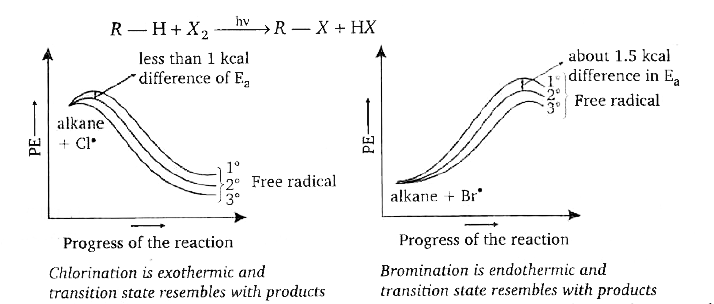
Chlorine free radical make `1^(@), 2^(@), 3^(@)` radicals with almost equal ease, whereas bromine free radicals have a clear preference for the formation of tertiary free radicals. So, bromine is less reactive, and more slective whereas chlorine is less selective and more reactive.
The relative rate of abstraction of hydrogen by Br is
`{:(3^(@),gt,2^(@),gt,1^(@)),((1600),,(82),,(1)):}`
The relative rate of abstraction of hydrogen by Cl is
`{:(3^(@),gt,2^(@),gt,1^(@)),((5),,(3.8),,(1)):}`
1-halo-2, 3-dimethyl butane will be obtained in better yields, if halogen is :01:42View SolutionHalogenation is a substitution reaction, where halogen replaces one or more hydrogens of hydrocarbon.
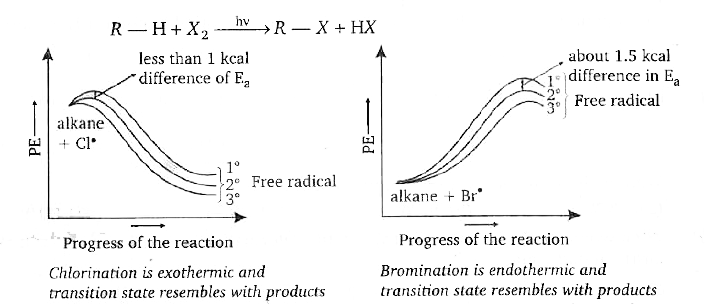
Chlorine free radical make `1^(@), 2^(@), 3^(@)` radicals with almost equal ease, whereas bromine free radicals have a clear preference for the formation of tertiary free radicals. So, bromine is less reactive, and more slective whereas chlorine is less selective and more reactive.
The relative rate of abstraction of hydrogen by Br is
`{:(3^(@),gt,2^(@),gt,1^(@)),((1600),,(82),,(1)):}`
The relative rate of abstraction of hydrogen by Cl is
`{:(3^(@),gt,2^(@),gt,1^(@)),((5),,(3.8),,(1)):}`
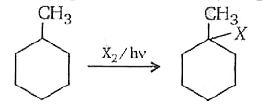
Above product will obtained in better yield if X is01:15View SolutionHalogenation is a substitution reaction, where halogen replaces one or more hydrogens of hydrocarbon.
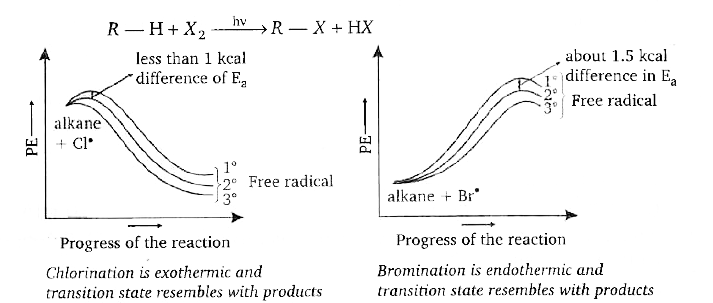
Chlorine free radical make `1^(@), 2^(@), 3^(@)` radicals with almost equal ease, whereas bromine free radicals have a clear preference for the formation of tertiary free radicals. So, bromine is less reactive, and more slective whereas chlorine is less selective and more reactive.
The relative rate of abstraction of hydrogen by Br is
`{:(3^(@),gt,2^(@),gt,1^(@)),((1600),,(82),,(1)):}`
The relative rate of abstraction of hydrogen by Cl is
`{:(3^(@),gt,2^(@),gt,1^(@)),((5),,(3.8),,(1)):}`
`CH_(3) - overset(CH_(3))overset(|)(CH) - CH_(3) overset(Cl_(2)//hv)(rarr)` Product
Major product in the above reaction is :01:51View SolutionHalogenation is a substitution reaction, where halogen replaces one or more hydrogens of hydrocarbon.
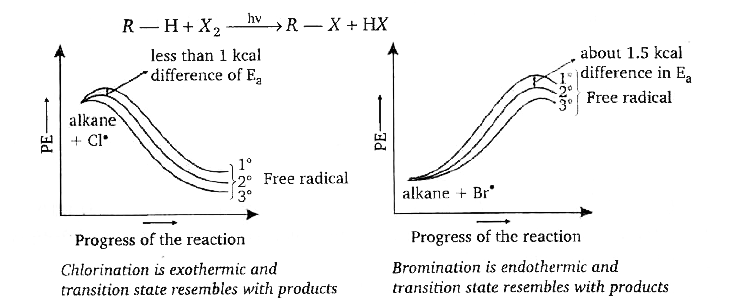
Chlorine free radical make `1^(@), 2^(@), 3^(@)` radicals with almost equal ease, whereas bromine free radicals have a clear preference for the formation of tertiary free radicals. So, bromine is less reactive, and more slective whereas chlorine is less selective and more reactive.
The relative rate of abstraction of hydrogen by Br is
`{:(3^(@),gt,2^(@),gt,1^(@)),((1600),,(82),,(1)):}`
The relative rate of abstraction of hydrogen by Cl is
`{:(3^(@),gt,2^(@),gt,1^(@)),((5),,(3.8),,(1)):}`
Which of the following will give five monochloro prodcuts, when allowed to react with `Cl_(2)` in presence of sun light (excluding stereoisomers) ?02:26View SolutionHalogenation is a substitution reaction, where halogen replaces one or more hydrogens of hydrocarbon.
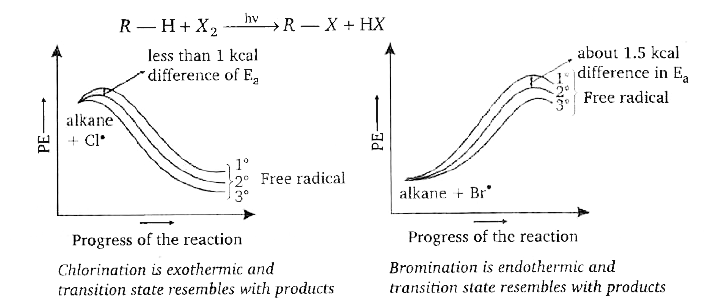
Chlorine free radical make `1^(@), 2^(@), 3^(@)` radicals with almost equal ease, whereas bromine free radicals have a clear preference for the formation of tertiary free radicals. So, bromine is less reactive, and more slective whereas chlorine is less selective and more reactive.
The relative rate of abstraction of hydrogen by Br is
`{:(3^(@),gt,2^(@),gt,1^(@)),((1600),,(82),,(1)):}`
The relative rate of abstraction of hydrogen by Cl is
`{:(3^(@),gt,2^(@),gt,1^(@)),((5),,(3.8),,(1)):}`
`CH_(3) - underset(CH_(3))underset(|)overset(CH_(3))overset(|)(C) - CH_(2) - overset(CH_(3))overset(|)(CH) - CH_(3) overset(Br_(2)//hv)(rarr) underset("2, Bromo-2, 5, 5 trimethyl pentane (x%)")(CH_(3) - underset(CH_(3))underset(|)overset(CH_(3))overset(|)(C) - CH_(2) - underset(Br)underset(|)overset(CH_(3))overset(|)(C) - CH_(3))`
What is the value of x (% yield of product) ?05:38View SolutionHalogenation is a substitution reaction, where halogen replaces one or more hydrogens of hydrocarbon.
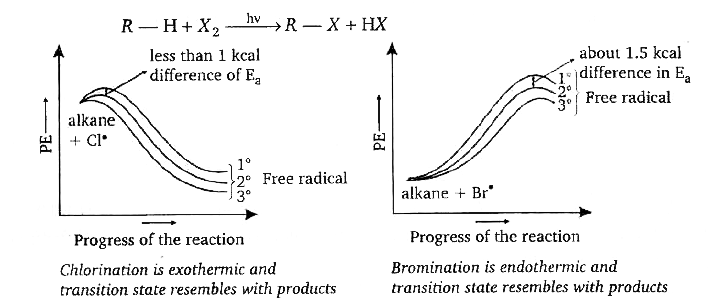
Chlorine free radical make `1^(@), 2^(@), 3^(@)` radicals with almost equal ease, whereas bromine free radicals have a clear preference for the formation of tertiary free radicals. So, bromine is less reactive, and more slective whereas chlorine is less selective and more reactive.
The relative rate of abstraction of hydrogen by Br is
`{:(3^(@),gt,2^(@),gt,1^(@)),((1600),,(82),,(1)):}`
The relative rate of abstraction of hydrogen by Cl is
`{:(3^(@),gt,2^(@),gt,1^(@)),((5),,(3.8),,(1)):}`
What would be the product ratio x/y in the chlorination of propane if all the hydrogen were abstracted at equal rate ?
`CH_(3) - CH_(2) - CH_(3) underset(hv)overset(Cl_(2))(rarr) CH_(3) - CH_(2) - CH_(2) - Cl + underset((y))(CH_(3) - underset(Cl)underset(|)(CH) - CH_(3))`02:38View SolutionHalogenation is a substitution reaction, where halogen replaces one or more hydrogens of hydrocarbon.

Chlorine free radical make `1^(@), 2^(@), 3^(@)` radicals with almost equal ease, whereas bromine free radicals have a clear preference for the formation of tertiary free radicals. So, bromine is less reactive, and more slective whereas chlorine is less selective and more reactive.
The relative rate of abstraction of hydrogen by Br is
`{:(3^(@),gt,2^(@),gt,1^(@)),((1600),,(82),,(1)):}`
The relative rate of abstraction of hydrogen by Cl is
`{:(3^(@),gt,2^(@),gt,1^(@)),((5),,(3.8),,(1)):}`
How many dichloro products (including stereoisomers) will be formed when R-2-chloropentane reacts with `Cl_(2)` in presence of UV radiation ?02:36View Solution
LEVEL - 2 (2. COMPREHENSION) questions and complete solutions for chapter HYDROCARBONS (ALKANES) of MS CHOUHAN of Class 12
